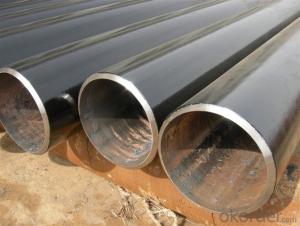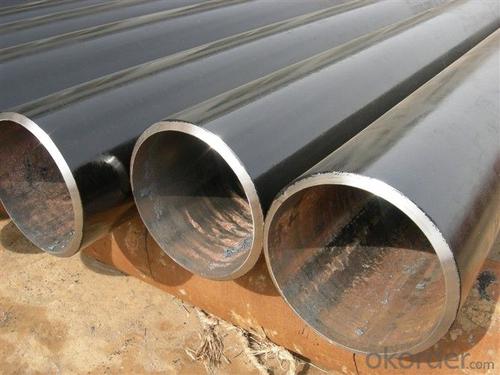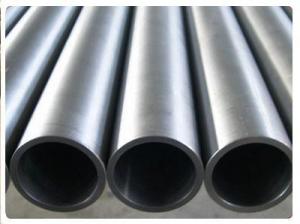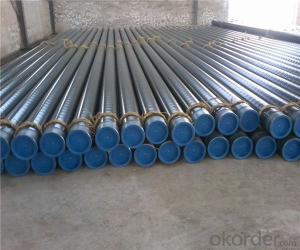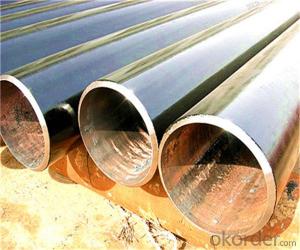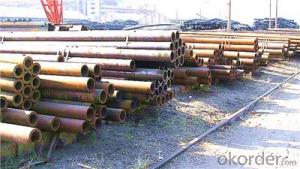Seamless Steel Pipe with cheap price from factory
- Loading Port:
- Tianjin
- Payment Terms:
- TT OR LC
- Min Order Qty:
- 50 m.t.
- Supply Capability:
- 100000 m.t./month
OKorder Service Pledge
OKorder Financial Service
You Might Also Like
PRODUCT DETAILS
1.Structure of Seamless Steel Pipe Description:
A large amount of Seamless Steel Pipes is offered to the clients at cost effective rates. These pipes are extremely durable, resistant to corrosion and have high tensile strength. Our pipes are used in nuclear plants, power plants, refineries and construction industry across the country. Furthermore, we are capable of providing these seamless pipes to the clients in bulk quantity.
2.Main Features of the Steel Pipe:
• High manufacturing accuracy
• High strength
• Small inertia resistance
• Strong heat dissipation ability
• Good visual effect
•Reasonable price
3.Packaging & Delivery:
| Packaging Details: | Seaworthy packages, bundles wrapped with strong steel strip |
| Delivery Detail: | 15-30 days after received 30% TT |
4.Seamless Steel Pipe Specification:
| Standard: | GB, DIN, ASTM,ASME, ASTM A106-2006, ASTM A53-2007 |
| Grade: | 10#,20#, 45#, 16Mn |
Thickness: | 8 - 33 mm |
| Section Shape: | Round |
| Outer Diameter: | 133 - 219 mm |
| Place of Origin: | Shandong, China (Mainland) |
| Secondary Or Not: | Non-secondary |
| Application: | Hydraulic Pipe |
| Technique: | Cold Drawn |
| Certification: | API |
| Surface Treatment: | factory state or painted black |
| Special Pipe: | API Pipe |
| Alloy Or Not: | Non-alloy |
| Length: | 5-12M |
| Outer Diameter: | 21.3-610mm |
5.Product pictures
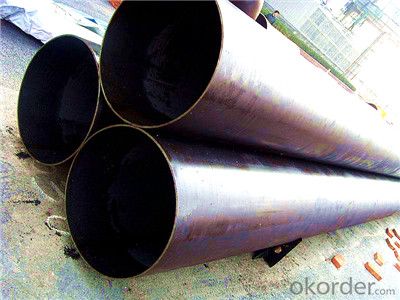
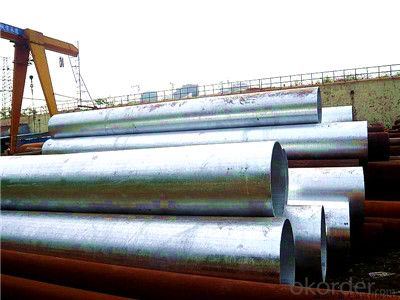
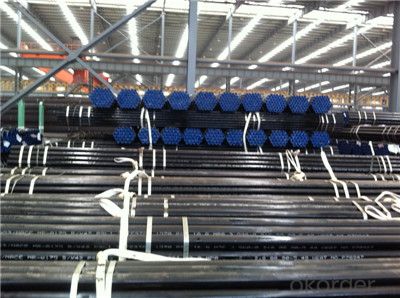
5.FAQ of Seamless steel pipe:
①How is the quality of your products?
Our products are manufactured strictly according to national and internaional standard, and we take a test
on every pipe before delivered out. If you want see our quality certifications and all kinds of testing report, please just ask us for it.
Guaranteed: If products’ quality don’t accord to discription as we give or the promise before you place order, we promise 100% refund.
②How about price?
Yes, we are factory and be able to give you lowest price below market one, and we have a policy that “ for saving time and absolutely honest business attitude, we quote as lowest as possible for any customer, and discount can be given according to quantity”,if you like bargain and factory price is not low enough as you think, just don’t waste your time.Please trust the quotation we would give you, it is professional one.
③Why should you chose us?
Chose happens because of quality, then price, We can give you both.Additionally, we can also offer professional products inquiry, products knowledge train(for agents), smooth goods delivery, exellent customer solution proposals.Our service formula: good quality+good price+good service=customer’s trust.
SGS test is available, customer inspection before shipping is welcome, third party inspection is no problem.
Any question, pls feel free to contact us !
- Q: Are steel tubes and round steel in weight or length when purchased?
- The price must be measured by weight, and the length, volume and other specifications should be entered
- Q: Can steel pipes be used for transporting sewage?
- Yes, steel pipes can be used for transporting sewage. They are commonly used in sewage systems due to their durability, strength, and resistance to corrosion.
- Q: What is the difference between hot-rolled and cold-rolled steel pipes?
- Hot-rolled steel pipes are produced at high temperatures and have a rougher surface finish. They are known for their flexibility and are often used in applications that require bending or shaping. On the other hand, cold-rolled steel pipes are produced at lower temperatures and undergo additional processing to achieve a smoother surface finish. They are generally stronger and more precise in dimensions, making them suitable for applications that require high precision and strength.
- Q: Are steel pipes resistant to impact?
- Yes, steel pipes are generally resistant to impact due to their high strength and durability. They can withstand external forces and are less likely to deform or break upon impact compared to other materials.
- Q: What's the difference between the fastener type steel pipe scaffold, the floor type steel pipe scaffold and the overhanging type steel pipe scaffold?
- Butt fastener: used for connecting two steel pipe joints.The base and the pad: is set up in the bottom of the pedestal pole, pay attention to the distinction between base and the base plate, usually with steel plate and welded steel pipe, base usually put on a backing plate, and the plate can be wood can also be plate.The foot board (see the diagram below), safety net (no explanation, this is very simple).
- Q: What are the common sizes of steel pipe fittings?
- Depending on the particular application and industry regulations, the sizes of steel pipe fittings can vary. Nevertheless, there are numerous standard sizes that are commonly utilized in various industries. These sizes encompass a range from ¼ inch to 48 inches in diameter. Among the most frequently used sizes are ½ inch, ¾ inch, 1 inch, 1 ¼ inch, 1 ½ inch, 2 inch, 2 ½ inch, 3 inch, 4 inch, 6 inch, 8 inch, 10 inch, 12 inch, 14 inch, 16 inch, 18 inch, 20 inch, 24 inch, 30 inch, 36 inch, 42 inch, and 48 inch. These sizes are often obtainable in different lengths to accommodate diverse installation requirements. To determine the appropriate size of steel pipe fittings for a specific project, it is crucial to refer to industry standards and specifications.
- Q: How do you repair a damaged steel pipe?
- To repair a damaged steel pipe, the first step is to assess the extent of the damage. Once identified, the damaged section can be cut out and replaced with a new piece of pipe. Alternatively, for smaller damages, patches or clamps can be used to cover the affected area. It is essential to clean and prepare the surface properly before applying any repair method, such as welding or epoxy. Seeking professional help is recommended for complex or extensive damages to ensure a safe and effective repair.
- Q: How are steel pipes used in the manufacturing of shipbuilding?
- Steel pipes are widely used in shipbuilding for various purposes such as the transportation of fluids, gases, and air systems, as well as structural applications. They are commonly used for the construction of ship hulls, bulkheads, and decks, providing strength and durability to withstand the harsh marine environment. Steel pipes are also used in the installation of various systems onboard, including fuel, water, and sewage systems, as well as ventilation and firefighting systems. Overall, steel pipes play a vital role in the construction and operation of ships, ensuring their functionality and safety.
- Q: How are steel pipes used in the construction of underground parking garages?
- Steel pipes are commonly used in the construction of underground parking garages for various purposes. They serve as structural supports, providing stability and strength to the overall structure. Steel pipes are also used for drainage systems, allowing for efficient disposal of water and preventing flooding. Additionally, they are utilized for the installation of utilities such as water, gas, and electrical lines, ensuring easy access and maintenance. Overall, steel pipes play a crucial role in the construction of underground parking garages by offering durability, functionality, and reliability.
- Q: Can steel pipes be used for transporting chemicals?
- Yes, steel pipes can be used for transporting chemicals. Steel pipes are known for their strength, durability, and resistance to corrosion, making them suitable for handling various chemicals. Additionally, steel pipes can withstand high pressure and temperature conditions, ensuring safe transportation of chemicals.
Send your message to us
Seamless Steel Pipe with cheap price from factory
- Loading Port:
- Tianjin
- Payment Terms:
- TT OR LC
- Min Order Qty:
- 50 m.t.
- Supply Capability:
- 100000 m.t./month
OKorder Service Pledge
OKorder Financial Service
Similar products
Hot products
Hot Searches
Related keywords
